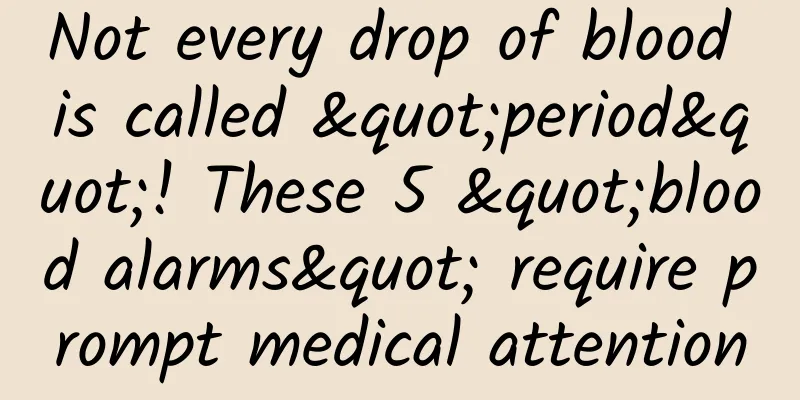10 weeks pregnant, no more nausea

|
Nausea, headache, stomach pain and other symptoms are common symptoms for pregnant women during pregnancy. These symptoms often cause great inconvenience to pregnant women and make them suffer. Some pregnant women suddenly stop feeling nauseous and want to vomit during the 10th week of pregnancy. So, what is the reason for this? 1. What is the reason for not feeling nausea and vomiting suddenly after 10 weeks of pregnancy? In fact, it is quite normal. Everyone's pregnancy reaction is different. After all, everyone's physical fitness is different. Most people are pregnant, around three months, and these pregnancy reactions will gradually subside. Maybe, the appetite will suddenly get better, and then there will be no nausea or vomiting. But the baby is actually quite healthy at this time, so don't worry, just go for follow-up visits on time, because if there is a threatened miscarriage, there may be abdominal pain and spotting, so try to relax and rest. How to relieve pregnancy nausea 1. Eat small and frequent meals: In terms of diet, it is recommended to eat small and frequent meals. Avoid eating greasy and irritating foods, which can reduce nausea, vomiting and other pregnancy reactions. Most women experience nausea and vomiting during the first three months of pregnancy, especially mild vomiting in the morning or at night, and some vomiting is very severe. This is called pregnancy reaction. Many people think that pregnant women can prevent nausea and retching by not eating or eating less. Some pregnant women are afraid of vomiting and are unwilling to eat. In fact, not eating not only cannot relieve vomiting, but also makes pregnant women lack vitamin A supply and demand balance, which is not good for mothers and babies. Nausea and vomiting in pregnant women are mainly caused by the stimulation of increased estrogen on the smooth muscles in the gastrointestinal tract. Mild nausea and retching may not require medical treatment, let alone diet or eating less. On the other hand, if you eat more food, you will feel better. It is best to eat 6 times a day, eat small and frequent meals, prepare some cookies in advance, eat a little at any time, and drink a glass of milk in the morning is better. After eating, rest in bed for 20 to 30 minutes. If you feel nauseous, eat a few cookies and the nausea will feel better. In addition, you should also pay attention to adjusting your diet, avoid eating foods that are indigestible, and eat more high-fiber foods such as bread, cookies, potatoes, rice, etc. 2. Vitamin B26 can stop vomiting. Many pregnant women have more severe reactions in the early stages of pregnancy, such as nausea and retching and cannot eat. Doctors usually allow them to take a small amount of vitamin B26 to stop vomiting. Some pregnant women believe that vitamin B26 is a vitamin needed by the body and has no disadvantages, so they take it for a longer period of time. In fact, excessive intake is harmful to the fetus. Due to long-term excessive intake of vitamin B26, the fetus will develop a sense of dependence on it, which is medically called vitamin B26 dependence. |
<<: Can pregnant women eat Artemisia
>>: The child does not have a fever but feels dizzy and nauseous
Recommend
The role of chorionic villus in transplanting frozen embryos
In vitro fertilization technology has come into e...
Mouth soreness in late pregnancy
There are many factors that cause sour mouth in t...
Pelvic inflammatory disease lower abdominal pain every day
Pelvic inflammatory disease causes lower abdomina...
Purple potato cakes should be made with flour or glutinous rice flour. What kind of flour should be used to make purple potato cakes delicious?
As we all know, purple sweet potato is a common f...
How many minutes does a hysteroscopy take?
Hysteroscopy is one of the examination methods to...
Why do I always have leucorrhea?
Leucorrhea is a body secretion during a woman'...
What to do if the normal thickness of the uterine lining becomes thinner
The uterus is very important to women. Many women...
How long is the best time to have menstruation after caesarean section
Cesarean section is a special method of delivery....
How often should you take a bath in winter? It turns out that there are some rules for taking a bath!
The strongest cold wave is coming Snow has starte...
Improver for yeast bread that doesn't get hard when it's cold What to add to yeast bread that doesn't get hard when it's cold
We all know that there are many ways to make cake...
Does "Shrek" really exist? ——The scientific knowledge you don't know about pituitary growth hormone adenoma
Author: Wei Yongxu, Ruijin Hospital, Shanghai Jia...
How to take care of yourself after a missed abortion
Missed abortion is a non-induced miscarriage meth...
Replacing regular salt with low-sodium salt can reduce the risk of stroke by 14% and the risk of death by 12%!
The average salt intake of Chinese people is 10-1...
Why is menstruation gray?
Women's menstruation is mainly menstrual bloo...
How to choose a treatment plan for lung nodules?
Author: Gao Xuehan Peking Union Medical College H...









